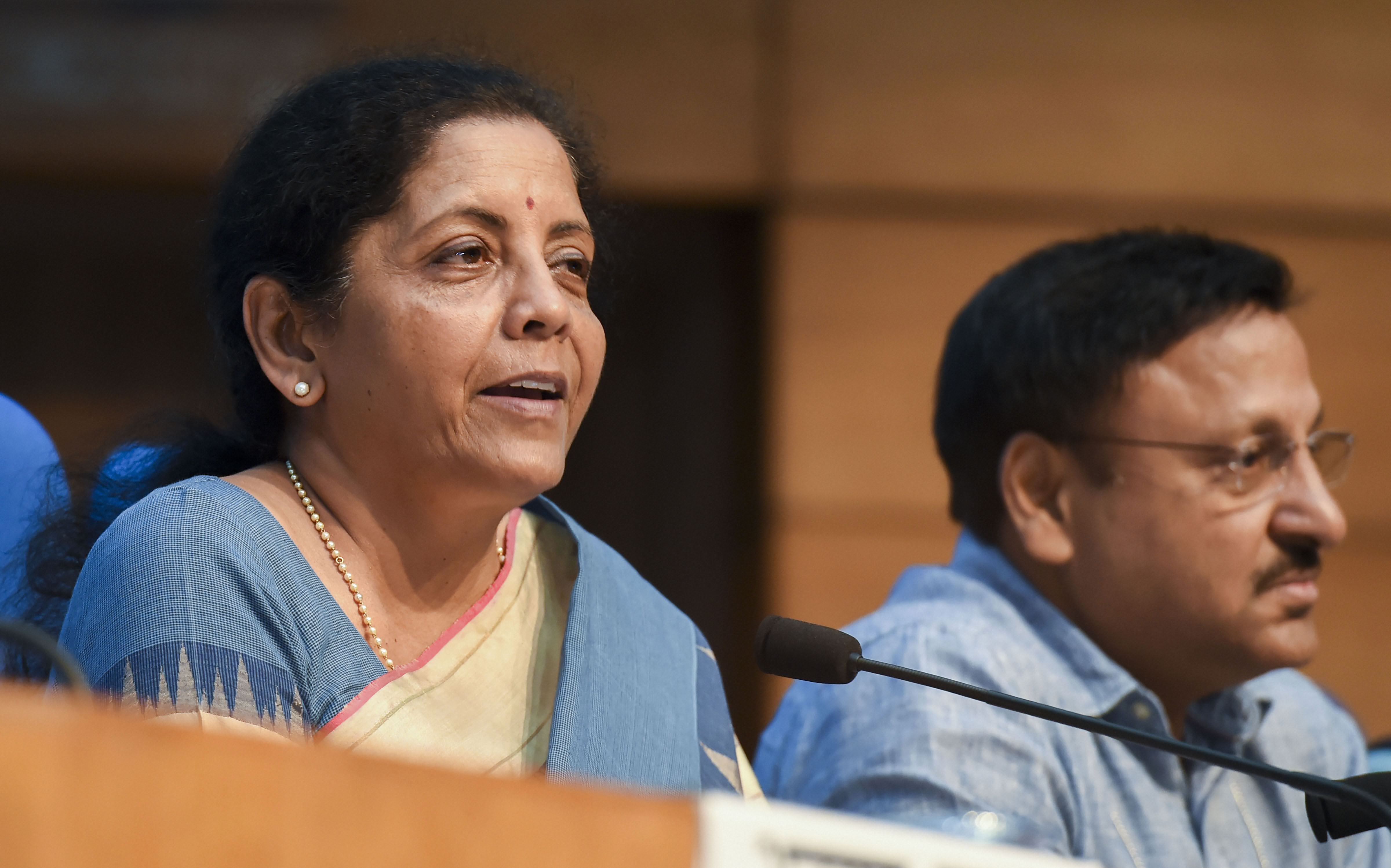
Nirmala Sitharaman rolls out measures to boost economy, promises more
Finance Minister Nirmala Sitharaman on Friday (August 23) announced a raft of measures to boost the economy, including a rollback of a tax surcharge on foreign portfolio investors (FP1s) and equities of domestic investors, lower interest rates on loans, besides steps to revive a slowdown-hit automobile sector.

Finance Minister Nirmala Sitharaman on Friday (August 23) announced a raft of measures to boost the economy, including a rollback of a tax surcharge on foreign portfolio investors (FP1s) and equities of domestic investors, lower interest rates on loans, besides steps to revive a slowdown-hit automobile sector.
Sitharaman said the government would withdraw ‘angel’ tax provision for startups and their investors, and this will cost the exchequer about Rs 1,400 crore.
She promised a review of enhanced surcharge on high net worth individuals in 2022 when the country celebrates 75th anniversary of Independence.
The government has decided to withdraw enhanced surcharge levied on long and short-term capital gains arising from transfer of equity shares.
“The pre-Budget position is restored. This is only a start of measures. More moves to stimulate the economy will be announced by middle of next week,” she said. “To address concerns of homebuyers, measures will be announced soon and another package will follow shortly.”
India’s GDP growth in the January-to-March quarter slid to a near five-year low of 5.8 per cent.
Also Read: Need new set of reforms to battle economic slowdown: Raghuram Rajan
“I want to assure that we are responsive to changes in the economy. Reforms is a continuous process for this government. Now, faster approvals are being given for mergers and acquisitions. GST filing will also be simplified further with fewer forms and will meet GSTN officials to remove further glitches in GST filing process,” she said.
Sitharaman assured observers that India’s growth was comfortably high compared to many developed countries in a weakening global economy, which was growing at 3.2 per cent amid trade wars and currency manipulations.
Among other announcements, she said CSR violations will not be treated as a criminal offence, banks will issue a one-time settlement plan for micro, small and medium enterprises (MSMEs), the government will infuse Rs 70,000 crore into public sector banks to enable release of Rs 5 lakh crore liquidity in the market and get banks to pass on rate the reduction to consumers.
Aadhar-based KYC will be permitted for opening of demat accounts and investing in mutual funds. Pending GST refunds will be paid to small businesses within 30 days. In future, all settlements will be done with 60 days.
Payments delayed by government departments and central public sector enterprises will be monitored by the Department of Expenditure on a dashboard for faster clearances.
Also Read: FM meets realtors, homebuyers; govt assures steps to boost liquidity, demand
For the automobile sector, which has been hit by up to 20% slowdown in sales, she said the higher registration fees has been deferred till June 2020. An additional 15 per cent depreciation will be provided on vechicles acquired from now till March 2020, taking the total depreciation to 30 per cent.
Industry welcomes measures
India Inc on Friday cheered the slew of measures announced by the government encompassing a broad range of sectors and said the impactful interventions will shore up confidence and revive the animal spirits in the economy that had started showing signs of a deep slowdown.
“The most important announcement was the removal of the surcharge on FPI & DI profits. Because this was strong evidence of a listening capacity&the humility to course-correct. More than anything else, that should regenerate spirits,” Mahindra Group Chairman Anand Mahindra tweeted.
CII Director General Chandrajit Banerjee said the “excellent package” would help the economy to leapfrog to the next level.
“While the increased depreciation from 15 per cent to 30 per cent and deferment of increased registration fees till June 2020 will have a positive impact, moderation of GST base rate from 28 per cent to 18 per cent for all categories as being requested by the auto industry for sometime now would have been the real demand stimulant!,” Jaguar Land Rover India Limited President and MD Rohit Suri said.
Assocham President B K Goenka said it is clear that the government is concerned with current economic situation and added that the industry will respond very enthusiastically to these praiseworthy moves.
FICCI President Sandip Somany said the measures will give a major boost to the economy that had started showing signs of a deep slowdown. As these measures take effect, we are sure that these will lift the confidence of businesses and investors alike, he added.

“We thank FM Smt. @nsitharaman Ji for announcing key measures which will give a boost to demand, industrial activity&overall growth of the Indian economy. Eagerly waiting for the Housing industry announcements,” CREDAI Chairman Jaxay Shah tweeted.
Economists and experts too said the announcements made by the government will have a positive impact on the economy.
Opposition slams govt
The Congress said the government has “confessed” that the Indian economy is under stress and questioned the “silence” of Prime Minister Narendra Modi.
Citing Niti Ayog vice chairperson Rajiv Kumar’s comments about stress in the financial sector, Congress spokesperson Manish Tewari said, “When you have the Indian economy enter its choppiest phase perhaps, the silence of the Prime Minister and the Finance Minister are deafening. All you see is deflection, politics of vendetta, undeclared emergency across the country.”
Niti Aayog Vice Chairman Rajiv Kumar said on Thursday the government was considering a number of measures which will be taken at an appropriate time to deal with financial stress and unleash animal spirit in the economy.
Tewari said on Friday over 3 crore people are currently facing a threat of becoming unemployed. “Every sector of economy is under grave stress. The textile industry has been putting out advertisements on a daily basis for past one week, explaining that this is perhaps the worst period which the textile industry has seen in the past seven decades.”
The primary reason for this is that the government does not have a clue as to how it will handle this crisis which is intensifying on a daily basis, Tewari said. “Much that the BJP-NDA government would like us to believe that this is because of Pandit Jawaharlal Nehru, unfortunately that is not the case. This is the making of the NDA-BJP government in the past five years,” he said.
NCP spokesperson Mahesh Tapase said there was no “roadmap of growth”. “The announcements have come very late and at a time when the economy is facing uncertainty and there is no roadmap of growth,” he said. Monetary circulation is at its lowest and investor confidence has “crashed”, he claimed. Manufacturing, retail and service sectors are badly hit, and lakhs of people have lost jobs, Tapase said. “The government missed the economic markers (of slow- down) and miserably failed to intervene in time,” he added.
(With inputs from agencies)

